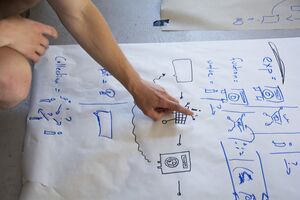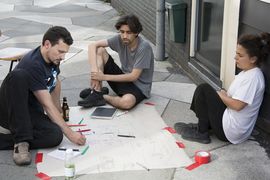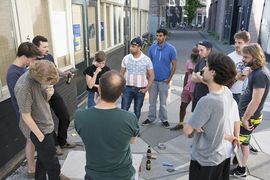Language Design: Difference between revisions
No edit summary |
No edit summary |
||
| (31 intermediate revisions by 6 users not shown) | |||
| Line 1: | Line 1: | ||
{{Event | |||
|Name=Language Design | |||
|Location=De Punt, Frans de Wollantstraat 84, 1018 SC Amsterdam | |||
|Date=2015/08/03 | |||
|Time=14:00-19:00 | |||
|PeopleOrganisations=Vadim Zaytsev | |||
|Type=HDSA2015 | |||
|Web=Yes | |||
|Print=Yes | |||
}} | |||
[[File:LanguageDesign2.jpg|Language Design workshop|thumb|]] | |||
Workshop by [[Vadim Zaytsev]] | ===Workshop by [[Vadim Zaytsev]]=== | ||
In first part of the the workshop we were introduced in the ways humans have been talking to machines and an overview of [[Computer language history]]. | |||
Topics of discussion in the Language Design session were: | |||
* Why do we use languages to communicate with computers? | |||
* What constitutes a computer language? | |||
* What are these language used for? | |||
* Why are people making new languages? | |||
* What components can the language be decomposed to, and how are they related? | |||
* Are modern languages different from older languages? | |||
For the hands-on part of the workshop we designed our own languages in groups after the [[Computer language design schema]]. Our achievements were analysed and in general list some recent achievements in software language design, requirements, analysis, implementation, evolution and mapping. | |||
One of the newly designed languages in the workshop is the visual emoji syntax: [[Pizza ordering language]] | |||
= | <gallery mode=packed> | ||
File:LanguageDesign.jpg | |||
File:LanguageDesign3.jpg | |||
</gallery> | |||
Latest revision as of 13:20, 13 December 2017
| Language Design | |
|---|---|
| Name | Language Design |
| Location | De Punt, Frans de Wollantstraat 84, 1018 SC Amsterdam |
| Date | 2015/08/03 |
| Time | 14:00-19:00 |
| PeopleOrganisations | Vadim Zaytsev |
| Type | HDSA2015 |
| Web | Yes |
| Yes | |
Workshop by Vadim Zaytsev
In first part of the the workshop we were introduced in the ways humans have been talking to machines and an overview of Computer language history. Topics of discussion in the Language Design session were:
- Why do we use languages to communicate with computers?
- What constitutes a computer language?
- What are these language used for?
- Why are people making new languages?
- What components can the language be decomposed to, and how are they related?
- Are modern languages different from older languages?
For the hands-on part of the workshop we designed our own languages in groups after the Computer language design schema. Our achievements were analysed and in general list some recent achievements in software language design, requirements, analysis, implementation, evolution and mapping.
One of the newly designed languages in the workshop is the visual emoji syntax: Pizza ordering language


